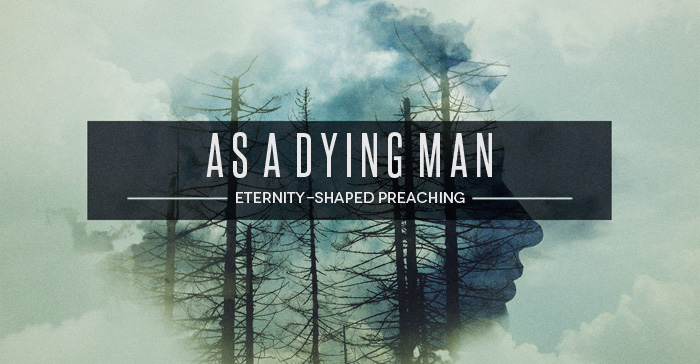The few faithful readers of this here blog know that my planned dissertation subject for The Institution is the saintly Robert Murray M’Cheyne. This fall I’m spending my time combing through all the autobiographical and biographical material I can get my hands on. My friends, this has been a soul feast of epic proportions. Today I want to give you a glimpse into just one way M’Cheyne is shaping my pastoral ministry.
As A Dying Man on the Edge of Eternity
Like his Puritan forebears M’Cheyne’s perspective can—and should be—modified by the adjective “eternal.” He was a man consumed with heavenly realities and that consumption was visible to all. Consider just a few quotes from the young pastor on the subject of eternity:
- “Live near to God, and all things will appear little to you in comparison with eternal realities.”
- “A great part of my time is spent in getting my heart in tune for prayer. It is the link that connects earth with heaven.”
- “As I was walking in the fields, the thought came over me with almost overwhelming power, that every one of my flock must soon be in heaven or hell.”
- “Life is vanishing fast. Make hast for eternity.”
- “Make all your service tell for eternity; speak what you can look back upon with comfort when you must lie in silence.”
- “Live for eternity.”
- “Speak to your people as on the brink of eternity.”
That last quote leads me to ask, “How did M’Cheyne fit his soul to speak as one on the brink of eternity?” Bonar gives us an idea when he writes, “It was [M’Cheyne’s] manner, on a Saturday afternoon, to visit one or two of his sick who seemed near the point of death, with the view of being thus stirred up to a more direct application of the truth to his flock on the morrow, as dying men on the edge of eternity.”
Consistent views of eternity caused M’Cheyne’s preaching to pulsate with an unusual earnestness. It caused his life to bask in the glow of heaven. It’s a model full of, for me at least, stirring conviction. As I’ve read and meditated on this most ordinary pastor I’ve settled on a two-fold pattern for an eternity-shaped ministry. Allow to sketch out my admittedly preliminary thoughts on the matter.
Live Always in the Sight of Eternity
Thinking often of death and eternity need not be a morbid endeavor. In fact, it’s a most biblical one. As Moses said in Psalm 90, “Teach us to number our days that we may get a heart of wisdom.” Wisdom preaches the reality of death, the brevity of life, and the glory of seeing Christ face to face. Setting your mind on things above transforms the heart to live as one always ready. If the adage “you become what you behold” is correct, then we must behold the eternal beauty of Jesus Christ. Such a sight gives a depth of joy, a fullness of hope, and a reverence of Spirit uncommon in this world. And I for one want to be a most uncommon pastor. I raise my glass to the ordinary pastors who are peculiar—peculiar because the rays of heaven have so manifestly shined upon their faces.
Living always in the sight of eternity brings power not only to a life of holiness, but also to evangelism. As M’Cheyne said, “I feel that there are two things it is impossible to desire with sufficient ardor: personal holiness, and the salvation of souls.” Seeing the glory of Christ seated on the throne ought to promote in our hearts the sentiment towards lost people, “I want you to see Him who is your life!” It reminds us that not all with see Christ as Savior, multitudes will see Him for the first time as Judge and nothing could be more terrifying.
Speak Always with the Savor of Eternity
One amazing thing I’ve notice about M’Cheyne is how often people were transformed just by observing his heavenly manner of life. Could someone say the same thing about me?
But what is even more undeniable are how many took hold of heaven through his preaching. He preached as, Old Baxter said, “A dying man unto dying men.” The terrors of hell and glories of heaven became real through his words. Read through his sermons and I doubt you’ll escape the battle he waged for eternity when standing behind the pulpit. Heaven became real to his hearers—oh, to have heard him preach!
Something will season our preaching. I often wonder what exactly seasons mine. How I pray the savor might not be one of my personality, but one of eternity. Perhaps this is now why I pray before every sermon, “Help me to preach as a dying man unto dying men.”

